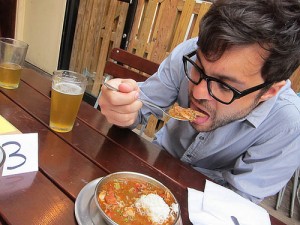In Your Words: the Importance of Authenticity in Food
Our post on what makes a restaurant authentic posed a question: does the authenticity of food matter to you? The responses so far indicate that no, as long as the food tastes good.
Bardia Ferdowski, an Iranian immigrant who opened a Cajun restaurant in Adams Morgan, was quoted in the original post as saying what matters the most is that “the food is good and comes from the heart.” Commenter rmpmcdermott agreed, writing:
“If you care enough about the food and the tradition and you study the culture and the reasons behind the food then you can make great food from any culture outside of your own. It’s all about respect to me. Respect for the culture. Respect for the ingredients. In fact I’ve had Italian food cooked by non-Italians who really cared about the food and it was way better than food I’ve had by Italians who clearly didn’t care.”
Houston Press food blog Eating Our Words weighed into the debate tweeting that “the concept of ‘authenticity’ is such a nebulous thing to define, much less capture.”
Even the best efforts of old country-trained chefs may be thwarted; some dishes can never be replicated due to differences in available ingredients, writes commenter lacrisha jones: “I think the only way to get ‘authentic’ cuisine is to go to the place where it actually comes from. The water, soil, grass and air all make a food what it is, and those elements can’t be transported somewhere else.”
Beware of restaurants that bill themselves as “authentic” in their advertising, writes Nandalal Nagalingam Rasiah, who “automatically distrusts” such establishments: “I find the words ‘good’ and ‘bad’ far more useful. There is a pizza place that serves 100% authentic Neapolitan pizza in my town but I 100% dislike Neapolitan pizza and thus it is ‘bad.’”
We also asked whether authenticity in cuisine was even desirable. Commenter Cob writes sometimes it is, but “mostly though, I want life to be fun and creative, and creativity inherently involves change and innovation:”
at home, i combine irish cooking with indian cooking. i mix my sense of mexican with thai. all the time. too many fun and delicious results occur and we lose out when we don’t mix things. creole is a prime example of why mixing is fantastic. creating Creole is all about throwing away authenticity. italian food wouldn’t be italian food if they hadn’t tossed away authenticity when marco polo got back.
All of this leads us to ask: does anyone take issue with the authenticity of the food they eat? If so, weigh in below.
-
NolaCola00
-
Phyllis Schwarzenberg








